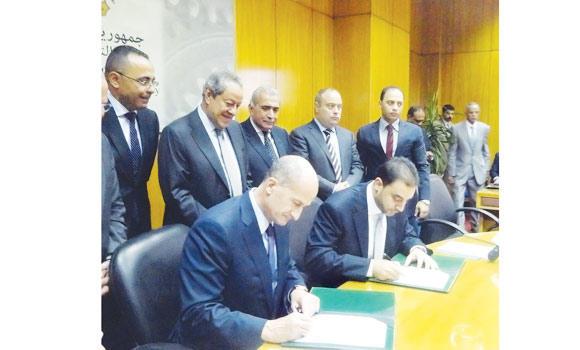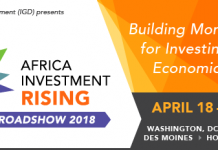The United States missed an opportunity to deepen its trade relations with Africa at this week’s U.S.-Africa Leaders Summit in Washington, D.C., a leading African executive says.
Furthermore, Washington is “confusing” the continent with the uncertainty in Congress over the fate of the U.S. Export-Import Bank, says Basil El-Baz, chairman and CEO of Carbon Holdings, a multi-billion-dollar Egyptian petrochemicals company that got its start in a Harvard University student dormitory.
“When we take a look at the free-trade agreements that we so desperately need on the continent, only one country has been successful, and that is Morocco. No other African country has a free-trade agreement with the United States. And so, it is important that we begin to push this through as Africans because this ultimately will help our production,” El-Baz said on Wednesday at the “Dialogue with African CEOs” event organized by U.S. Congressman Gregory W. Meeks and the Congressional Black Caucus Africa Task Force.
“In fact, [the Summit] would have been the opportune time to have the 47 heads of state and prime ministers sign signatory pages to the Moroccan Free-Trade Agreement, and call it the U.S.-Africa Free Trade Agreement,” El-Baz said to enthusiastic applause.
The packed CEO Dialogue was held on the final day of the three-day U.S.-Africa Leaders Summit that brought nearly 50 African heads of state and government and more than 100 of the continent’s business leaders to Washington. Organized by the White House with emphasis on Africa’s development in partnership with the United States, the Summit was the largest event any U.S. president has held with African heads of state and government.
The Africa Growth and Opportunity Act (AGOA), a one-way trade-preference program that allows duty-free entry into the United States for specific products from designated countries (currently 39), is the cornerstone of U.S. commercial engagement with Africa.
That program aside, the United States has 11 trade and investment framework agreements, or TIFAs, in Africa—eight with individual countries (Angola, Ghana, Liberia, Mauritius, Mozambique, Nigeria, Rwanda, and South Africa) and three with regional bodies (the Common Market for Eastern and Southern-COMESA; the East African Community; and the West African Economic and Monetary Union-WAEMU).
The United States also has a joint trade, investment, and development cooperative agreement, or TIDCA, with the five countries of the Southern African Customs Union (Botswana, Lesotho, Namibia, South Africa, and Swaziland), and bilateral investment treaties, or BITs, with seven African partners (Cameroon, Democratic Republic of Congo, Republic of Congo, Egypt, Mozambique, Rwanda, Senegal, and Tunisia.
None of these agreements allow for the free flow of goods and services between the United States and African countries.
A TIFA simply provides strategic frameworks and principles for dialogue on trade and investment issues between the two sides. The TIDCA with SACU established a forum for discussions, cooperative work, and possible agreements on such trade issues as customs and trade facilitation, technical barriers to trade, sanitary and phytosanitary measures, and trade and investment promotion. BITs, meanwhile, lay down terms and conditions for private investment by U.S. nationals and companies.
During his remarks, El-Baz used his own company’s experience to show the importance of the U.S. Export-Import Bank and its development partner agencies to emerging economies like those in Africa.
“My company was a university startup, with one employee, in a university dormitory. And it began with a simple loan application to the United States Trade and Development Agency to fund a feasibility study—an idea. And they responded. It seemed to make sense,” he said. “That feasibility study was submitted to the Export-Import Bank of the United States for a comprehensive loan guarantee…and after four years of pestering Ex-Im Bank, the loan was approved. Today we are over 1,400 employees, with assets in excess of $1 billion, and we are now talking about a potential public offering.”
In November, General Electric Co. and Carbon Holdings signed a $500 million partnership agreement to provide technology and equity support to the greenfield naphtha cracker and olefins complex project of Tahrir Petrochemicals in Ain Sokhna, Egypt. (El-Baz, seated right above, at the signing ceremony.)
U.S. agencies that assist development overseas, albeit with an eye toward enhancing U.S. exports, are critical to Africa’s goals, El-Baz stressed, citing the United States Trade Development Agency, the Overseas Private Investment Corporation (OPIC), the U.S. Agency for International Development (USAID) and the U.S. Ex-Im Bank.
“There are things that I see that are confusing, such as this discussion of not reauthorizing Ex-Im. In the last ten months Ex-Im has authorized $1.7 billion of power generation financing for the continent of Africa. It is U.S. firms, supplying U.S.-manufactured goods and services that are coming in under these programs,” he said.
He urged Congress to reauthorize Ex-Im Bank when its charter expires at the end of September.
“Failure to do so is effectively voting against the development of Africa. If you take a look at Turkey, if you take a look at Brazil, if you take a look at those economies that have passed through basic development and begun the reindustrialization process you will find that there is a linear basis to their borrowing from Ex-Im,” El-Baz said.
Conservatives in the Republican Party have mounted a forceful opposition to what routinely has been the extension of the charter, arguing that the bank is a market-distorting tool and an agent of corporate cronyism.













